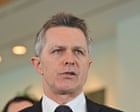
In response to recent alarming incidents, Australia is taking decisive steps to enhance the safety of childcare environments. The federal government has announced plans to expedite the introduction of legislation aimed at reinforcing safety measures within childcare centers. This proactive approach underscores a commitment to creating secure settings for young learners and provides peace of mind to parents concerned for their children’s well-being.
The proposed federal legislation, anticipated to be debated in the upcoming parliamentary sessions, will equip authorities with expanded powers to execute unannounced inspections, known as spot checks, and swiftly withdraw funding from operators who fail to adhere to prescribed safety standards. Education Minister Jason Clare emphasized the importance of holding childcare providers to high safety standards, ensuring that centers remain places of trust and nurturing for children.
This initiative is complemented by efforts at the state level, particularly in Victoria. Following serious allegations of misconduct by a childcare worker in Melbourne’s western suburbs, the Victorian government has appointed Jay Weatherill, the former South Australian premier, and senior bureaucrat Pamela White to lead an urgent review of the childcare sector. With their extensive expertise, Weatherill and White are tasked with a thorough analysis to identify and rectify any vulnerabilities within the system.
Further supporting this initiative, advocacy from the Greens Party calls for the establishment of an independent watchdog dedicated to childcare safety. Such a body would provide sustained oversight, ensuring that safety protocols are consistently met across the sector, and fostering a sense of trust among families.
While governmental efforts lay the groundwork for systemic enhancement, parents also play a crucial role in safeguarding their children. Engaging in thoughtful conversations about body safety and personal boundaries can empower children to express themselves openly and seek help when necessary. Experts suggest that using straightforward, age-appropriate language allows children to articulate their feelings and understand boundaries effectively. This approach not only cultivates awareness but also encourages children to approach trusted adults whenever they encounter uncomfortable situations.
Amidst these developments, it is important for society to view these discussions through a lens of empathy and understanding, recognizing the collective responsibility to protect the youngest members of the community. The combined efforts of robust legislative measures, vigilant oversight, and informed parental communication form a formidable defense against the vulnerabilities that may exist in childcare settings.
In a step towards ensuring safety beyond childcare and into broader community spaces, other measures are being taken, such as those observed in Portugal. Here, increased restrictions have been imposed on access to beaches in the Barreiro area due to pollutants. The Seixal Municipal Council is closely monitoring the situation and has committed to implementing necessary actions to safeguard public health and the environment. This vigilant approach highlights the significance of maintaining safe havens, not only in places of learning but in recreational areas as well.
Both in Australia and globally, the focus on improving safety and guardianship in spaces inhabited by children serves as a reminder of the intrinsic value placed on their welfare. Through concerted efforts at every level—from legislative frameworks to parental guidance—communities unite in fostering environments where children can safely learn and grow.
Source: {link}
